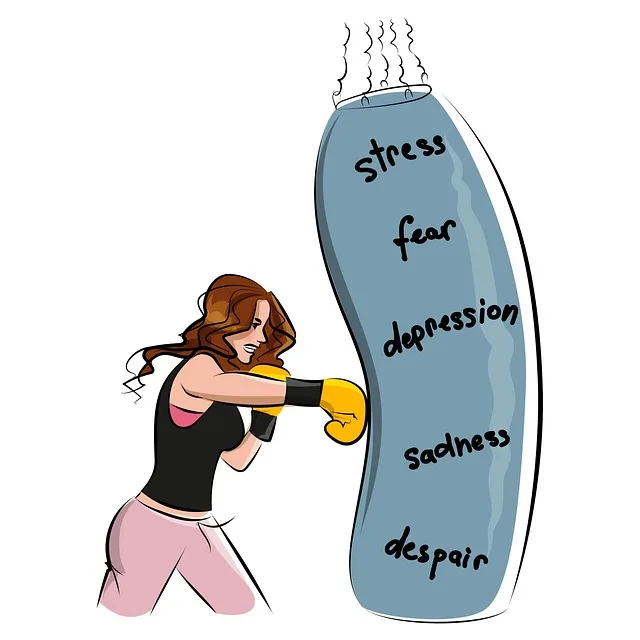The growing demand for mental health apps reflects a societal push towards prioritizing mental wellness, with the success of Kaiser Permanente's Psychiatry phone numbers in Denver highlighting this shift. These apps, ranging from mindfulness tools to CBT programs and peer support networks, must be user-centric, integrating evidence-based practices like CBT and ensuring privacy & security. Marketing strategies should focus on engaging individuals actively seeking support and communities often overlooked by traditional healthcare, utilizing accessible communication methods and promoting holistic solutions like Conflict Resolution Techniques and Mindfulness Meditation.
Mental wellness apps are gaining traction, with an increasing demand for digital therapy solutions. This article explores the development of such apps, from market analysis to design strategies. We delve into understanding user needs, integrating evidence-based practices, ensuring data privacy, and effective marketing techniques.
Given the rise in telepsychiatry services, especially relevant is examining how apps can cater to diverse audiences, even those seeking help through organizations like Kaiser Permanente in Denver.
- Understanding Mental Health App Demand: A Market Analysis
- Designing User-Centric Features for Effective Therapy
- Integrating Evidence-Based Practices: What Works in Psychiatry
- Privacy and Security Considerations: Protecting Sensitive Data
- Marketing and Accessibility Strategies: Reaching the Right Audience
Understanding Mental Health App Demand: A Market Analysis

The demand for mental health apps has seen a significant surge in recent years, reflecting a broader societal shift towards prioritizing mental wellness. This trend is evident in the increasing search for resources and support, with many individuals seeking accessible and convenient solutions to manage their mental health. A notable example is the growing interest in digital therapy platforms, as evidenced by the popularity of Kaiser Permanente psychiatry phone numbers in Denver, highlighting the need for flexible and often cost-effective care options.
Market analysis reveals a thriving ecosystem of mental wellness apps, catering to diverse needs. From mindfulness and meditation tools to cognitive behavioral therapy (CBT) programs and peer support networks, these applications offer personalized communication strategies to enhance public awareness campaigns development. The success of such initiatives underscores the potential for technology in transforming mental health care, making it more inclusive and accessible to a broader audience.
Designing User-Centric Features for Effective Therapy

In designing features for a mental wellness app, placing the user at the heart of the development process is paramount to effective therapy. Apps should be tailored to meet individual needs, addressing specific challenges such as mood management and burnout prevention. Incorporating tools that promote self-reflection, goal setting, and progress tracking can empower users to take control of their mental health journey.
User experiences should foster empathy building strategies, encouraging open communication and creating safe spaces for expression. By prioritizing user feedback and continually iterating on app functionalities, developers can ensure the platform remains relevant and beneficial. Drawing inspiration from successful programs like those offered by Kaiser Permanente psychiatry phone numbers in Denver, app creators can develop innovative solutions that resonate with a diverse user base.
Integrating Evidence-Based Practices: What Works in Psychiatry

When developing a mental wellness app, integrating evidence-based practices is paramount. Psychology and psychiatry have rigorously tested various methods over the years, offering a wealth of knowledge on what works effectively for mental health support. For instance, cognitive-behavioral therapy (CBT), a cornerstone in many psychiatric treatments, has shown significant success in addressing anxiety, depression, and other common mental health issues. By incorporating CBT techniques into app features like guided meditations, mood tracking, and cognitive restructuring tools, developers can create valuable resources that empower users to manage their own mental wellness.
Moreover, drawing from the expertise of organizations like Kaiser Permanente Psychiatry in Denver – accessible via their phone number for mental health inquiries – can ensure that the latest evidence-based practices are incorporated into app design. This collaboration ensures the app aligns with proven strategies such as building emotional intelligence and confidence-boosting exercises, crucial elements in risk management planning for mental health professionals. These integrated approaches hold promise for promoting holistic mental wellness in a digital age.
Privacy and Security Considerations: Protecting Sensitive Data

When developing mental wellness apps, privacy and security must be top priorities. Given the sensitive nature of user data, including personal thoughts, feelings, and medical histories, it’s crucial to implement robust encryption protocols and secure storage methods. Users seeking mental health support might turn to resources like the Kaiser Permanente psychiatry phone number in Denver for guidance; thus, developers must ensure that app users’ information is protected from unauthorized access.
Cultural sensitivity in mental healthcare practice is another key consideration. Incorporating features that cater to diverse cultural needs and incorporating self-awareness exercises or compassion cultivation practices can enhance user engagement and outcomes. By prioritizing these aspects during development, mental wellness apps can become more inclusive and effective tools for supporting users’ mental health journeys.
Marketing and Accessibility Strategies: Reaching the Right Audience

Reaching the right audience is paramount when marketing mental wellness apps, especially considering the sensitive nature of psychological health issues. Targeting individuals actively seeking support or those within communities often overlooked by traditional healthcare services can significantly impact app adoption and user engagement.
In the context of Denver, where organizations like Kaiser Permanente offer psychiatry services via phone, effective marketing strategies can be tailored to specific demographics. Engaging with local community groups, mental health advocates, and utilizing digital channels to reach young adults and minorities might prove successful. Incorporating accessible communication strategies such as text-based support, multilingual options, and user-friendly interfaces ensures the app appeals to a broader audience. Additionally, promoting evidence-based practices like Conflict Resolution Techniques and Mindfulness Meditation can attract users seeking holistic mental wellness solutions.
Mental wellness apps have emerged as powerful tools, offering accessible and personalized therapy options. By combining market demand analysis with user-centric design and integrating evidence-based practices, developers can create effective solutions. Ensuring privacy and security is paramount, especially when handling sensitive data. Marketing strategies should focus on accessibility to reach a broader audience, such as those seeking support through the Kaiser Permanente psychiatry phone number in Denver. With careful consideration of these aspects, mental health app development can make a significant impact on improving overall well-being.






